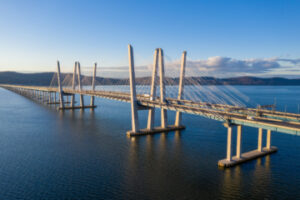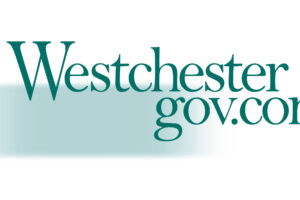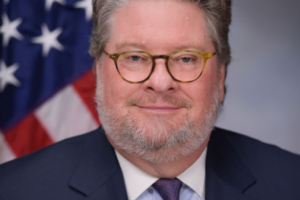 No matter what you call the bridge connecting Rockland and Westchester counties, you’ll be paying more to cross it starting next year, if the New York State Thruway Authority’s proposal gains approval.
No matter what you call the bridge connecting Rockland and Westchester counties, you’ll be paying more to cross it starting next year, if the New York State Thruway Authority’s proposal gains approval.
The so-called three-year “toll adjustment” plan announced last December is in the midst of an approval process that includes local public hearings, with a statewide virtual hearing set for June 5. The Thruway Authority Board of Directors will issue a final determination later this year.
Here’s what the proposed rate hikes — the first for NY E-ZPass customers since 2010 — would mean for drivers crossing the Mario M. Cuomo Bridge from Rockland to Westchester:
- NY E-ZPass tagholders who now pay $5.75 would be charged $6.25 in 2024 with the cost rising to $7.75 in 2027.
- Resident NY E-ZPass tagholders from Rockland or Westchester who now pay $4.75 would be charged $5 in 2024 with the cost rising to $6.20 in 2027.
- For drivers registered for the NY E-ZPass commuter plan requiring more than 20 trips per month who currently pay $3.45, the cost of a trip would increase to $3.75 in 2024 and to $4.65 by 2027.
- For drivers with out-of-state E-ZPass tags who now pay $6.61, the cost would rise from $10.94 in 2024 and to $13.56 by 2027.
- Drivers being billed through Tolls By Mail who now pay $7.48 would be charged $10.94 in 2024, with this cost rising to $13.56 by 2027.
The Hudson River span wouldn’t be the only place where prices would rise under the proposal. Tolls along the entire length of the 570-mile Thruway would rise 5 percent next year and another 5 percent in 2027.
The Thruway Authority says it needs the increases to fulfill its operating, debt service and capital projects. The state says 85 percent of the highway system’s base dates back to its original construction, highlighting the need for heavy maintenance, reconstruction and rehabilitation to keep the roads in good repair.
The average age of the Thruway’s 815 bridges is 55 years old with 75 percent of those bridges more than 60 years old, according to the Thruway. More than 85 of them have been identified for replacement within the next decade.
State Comptroller Thomas DiNapoli’s office found gaps in information necessary to evaluate the toll hikes.
The comptroller urged the state to resolve cashless tolling and toll-by-mail issues; perform an assessment of operating needs and expenses to identify costs that may no longer be necessary; maximize non-toll revenue sources including federal funding; and disclose a capital needs assessment to justify cost projections.
“The Thruway Authority’s toll increase proposal comes at a time of extraordinary challenges for New Yorkers who are faced with rising costs for everything from food to shelter to gas,” DiNapoli stated. “The Thruway should be more transparent with the public and disclose critical information, and identify and put in place all possible cost-savings and alternative revenue actions to minimize costs to drivers. Raising tolls should be the last option, and the Thruway has more work to do.”
Have your say
There’s still time to drive home your point before the proposal goes into effect Jan. 1, 2024.
- A virtual hearing will be held through Cisco Webex events and streamed online at thruway.ny.gov from 4.-7 p.m. Monday, June 5.
- Register at thruway.ny.gov if you’d like to comment during the hearing. You’ll need to provide a name, phone number and valid email address. A confirmation email will be sent to speakers with instructions on how to participate in the Webex hearing.
- Comments can be submitted by email to tollcomments@thruway.ny.gov or mail to: Toll Comments; c/o Legal Department; New York State Thruway Authority, 200 Southern Blvd., P.O. Box 189 Albany, NY 12201-0189






